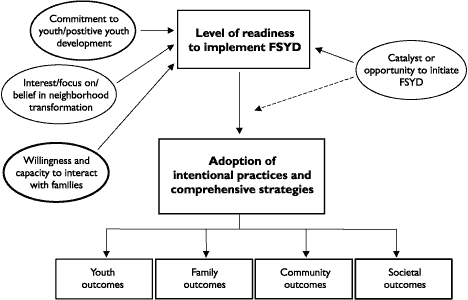The Harvard Family Research Project separated from the Harvard Graduate School of Education to become the Global Family Research Project as of January 1, 2017. It is no longer affiliated with Harvard University.
Volume IX, Number 1, Spring 2003
Issue Topic: Evaluating Out-of-School Time
Beyond Basic Training
Understanding Family Strengthening to Promote Youth Development
Dr. Geri Lynn Peak, a consultant and formerly the Managing Director of the Center for Applied Research and Technical Assistance, describes the evolution, practice, and potential assessment of a family strengthening approach to promote positive youth development.
Family strengthening to promote youth development (FSYD) is an approach to positive youth development where the involvement of families is purposefully woven into a program’s mission and practice. FSYD strategically ties the success of youth to the health and well-being of their families, to their connection to a network of caring adults, and to their integration in a vibrant community. In so doing, FSYD targets family outcomes directly, along with youth outcomes. FSYD is not a specific intervention or program, but a mindset where the essential importance of families is affirmed.
FSYD is at an initial stage of development and is gaining momentum as a successful way of thinking about positive youth development. While many youth programs show concern for family needs in an ad hoc way, programs benefit youth more when they intentionally incorporate family involvement. FSYD provides a needed catalyst to build family and community capacity to support the transition to adulthood. Programs integrating FSYD principles can:
- Improve the ability of families and family members to meet their own needs.
- Increase the capacity of families to meet the needs of young people as they navigate adulthood transition.
- Help family members reinforce and facilitate the development of positive youth development skills and competencies.
Evolution of FSYD
FSYD evolved when the Annie E. Casey Foundation encouraged experts to examine innovative, successful positive youth development programs to document whether and how families were engaged. This led to an initial “practice” framework, which the Center for Applied Research and Technical Assistance (CARTA) refocused to emphasize the importance of motivational factors that drive programmatic activities and outcomes.¹
CARTA then developed a theory of action framework to illustrate how programs can include family-centered activities in their work by integrating the FSYD mindset (see diagram below).² Ideally, programs will develop comprehensive approaches that target youth and their families, allowing them both to:
- Have access to more caring and supportive social and institutional networks.
- Have access to a wider range of engaging activities.
- Make meaningful contributions to their programs, families, and communities.
- Increase their capacity to become more self-sufficient, better aware of community challenges, and empowered to become actively involved in community change.
Family Strengthening Youth Development (FSYD) Theory of Action

FSYD in Practice
Currently, the Casey Foundation is working to encourage the integration of FSYD into programs throughout their Making Connections network and beyond.³ Programs are encouraged to develop customized strategies to implement FSYD; then programs initiate or formalize ongoing activities that target family outcomes. Family strengthening program activities fall into four categories:
Mentoring
Traditional adult-child relationships and broader mentoring approaches, such as intergenerational and adult/adult mentoring.
Monitoring
Collective responsibility, commitment, and accountability for the well-being of youth. Adults in the community are aware of what youth are involved in and feel responsible to engage young people who are not positively involved.
Mobilizing
Families, including adults and youth, engage in community organizing and community-building activities.
Management
Assisting families with accessing and coordinating needed resources and services.
Assessing FSYD
Supporters of FSYD anticipate positive short- and long-term outcomes, yet any tangible effects of integrating this mindset have not yet been determined by systematic study. Programs that intentionally adopt FSYD need to monitor and assess their work in order to determine its value. Evaluators must document not only what programs are doing, but also why they are doing it and whether their activities are linked in some way to anticipated outcomes. It is still unclear what outcomes will result or what value is added when these approaches with families are put into place. The potential for success has led CARTA to expand their efforts with FSYD. Their most recent work focuses on assessing the value of integrating FSYD with programs that serve vulnerable youth within public systems of care and aligning FSYD practice with family development theory.
Geri Lynn Peak
Independent Consultant
Two Gems Consulting Services
1016 Lenton Avenue
Baltimore, MD 21212
Tel: 410-323-7212
Fax: 410-323-3416
Email: geripeak@charm.net
For more information about FSYD, contact: Center for Applied Research and Technical Assistance, 1800 North Charles Street, Suite 902, Baltimore, MD 21201.
¹ See Berglund, M. L. (1999). More than a youth program: A best practices assessment of family-centered positive youth development (FC-PYD) approaches. Seattle, WA: Social Development Research Group.
² Peak, G. L. (2001). Family-strengthening youth development: A position paper. Baltimore: Center for Applied Research and Technical Assistance.
³ The 22 Making Connections cities nationwide strive to strengthen neighborhoods by connecting families to organizations and networks that provide economic, education, safety, and healthcare opportunities.

